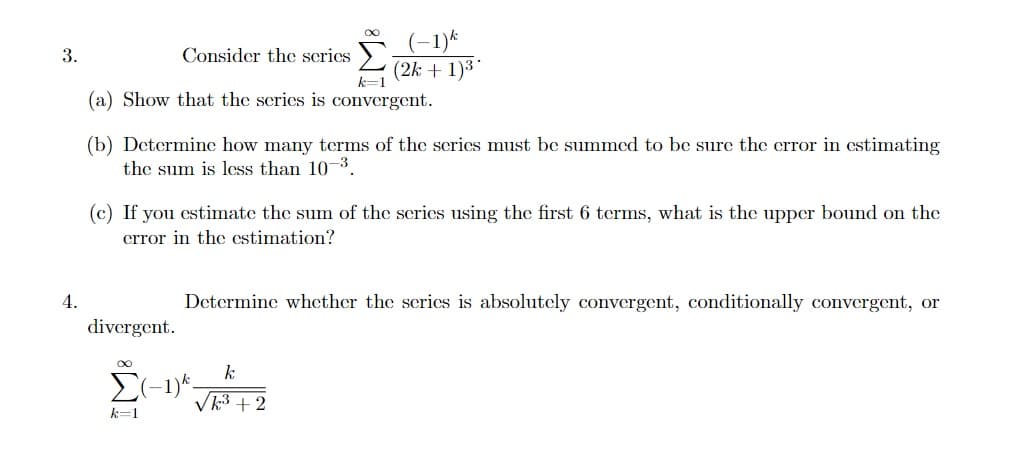Consider the scries > (-1)k (2k + 1)3* k=1 (a) Show that the scries is convergent. (b) Determine how many terms of the series must be summed to be sure the crror in estimating the sum is less than 10-3. (c) If you cstimate the sum of the series using the first 6 terms, what is the upper bound on the crror in the estimation? 11 3.
Consider the scries > (-1)k (2k + 1)3* k=1 (a) Show that the scries is convergent. (b) Determine how many terms of the series must be summed to be sure the crror in estimating the sum is less than 10-3. (c) If you cstimate the sum of the series using the first 6 terms, what is the upper bound on the crror in the estimation? 11 3.
Algebra & Trigonometry with Analytic Geometry
13th Edition
ISBN:9781133382119
Author:Swokowski
Publisher:Swokowski
Chapter10: Sequences, Series, And Probability
Section10.1: Infinite Sequences And Summation Notation
Problem 72E
Related questions
Question
Please do all steps and explain. Thank you.

Transcribed Image Text:Note: In problems on determining scries convergence or divergence, include:
• The name of the convergence test or the definition used,
• work to show that the test conditions have been met or work to apply the
definition,
• and a conclusion statement about convergence or divergence.

Transcribed Image Text:(-1)*
(2k + 1)3
3.
Consider the scrics
(a) Show that the scries is convergent.
(b) Determine how many terms of the scrics must be summed to be sure the crror in cstimating
the sum is less than 10 3.
(c) If you cstimate the sum of the scries using the first 6 tcrms, what is the upper bound on the
crror in the cstimation?
4.
Determine whether the scrics is absolutely convergent, conditionally convergent, or
divergent.
E(-1)*.
Vk3 +2
k=1
Expert Solution
This question has been solved!
Explore an expertly crafted, step-by-step solution for a thorough understanding of key concepts.
Step by step
Solved in 3 steps with 2 images

Recommended textbooks for you

Algebra & Trigonometry with Analytic Geometry
Algebra
ISBN:
9781133382119
Author:
Swokowski
Publisher:
Cengage


Algebra & Trigonometry with Analytic Geometry
Algebra
ISBN:
9781133382119
Author:
Swokowski
Publisher:
Cengage
